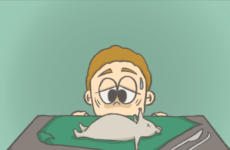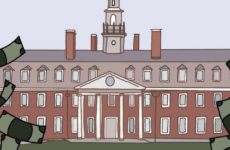During a recent school meeting, psychologist and motivational speaker Dr. Matt Bellace addressed our community, encouraging students to find “natural highs” that take the edge off of life in a healthier and more sustainable way than drugs ever could. He relayed his personal history, including a poignant account of his brother’s substance abuse, and moved the whole crowd to laughter with the best crowd involvement Choate has seen since the ever-popular hypnotist last fall.
We greatly appreciate the administration expending resources in an effort to improve the quality of student life on campus. We agree with Dr. Bellace’s encouragement to lead a healthier, more positive lifestyle. We recognize the dangers of substance abuse, and we believe that finding healthy outlets to relieve stress, such as laughter and socialization, is critical to a student’s ability to have a fulfilling Choate experience. Dr. Bellace was funny, engaging, and moving, and his presentation was well received by the student body.
For decades, Choate has enforced a one-strike drug policy — a single dalliance with an illegal substance and you’re out. The truth of the matter is that such zero-tolerance policies don’t keep kids safe or off drugs. As many in Dr. Bellace’s position know, research long ago indicated that the best way to reduce drug dependency is to reduce — surprise! — the impact of risk factors for substance abuse. These include, perhaps most prominently, harmful social and family situations.
A 1992 study published in Psychological Bulletin, a journal of the American Psychological Association, suggested that, while the simple banning of drugs will not reduce their abuse, drug (and alcohol) use can likely be decreased if adults help teenagers build strong relationships, improve academic achievement, and resist harmful social and cultural influences. This approach appeared likely to be most successful if problems in a student’s behavior or family were also addressed. We cited a similar A.P.A. report, this one from 2008, in a policy document we presented to the administration last spring, outlining our arguments against zero tolerance.
Research also suggests that counseling can be an effective way to help kids who struggle with dependency. We believe Choate does a good job of recognizing the effectiveness of counseling programs, and are especially grateful for the work that it’s done in working with students fighting substance abuse. But the time is now for Choate to consistently treat drug use as the mental health problem it is.
So, for the school to be serious in its efforts to reduce drug use and increase student safety, it must rewrite its policy. Programs like Peer Educators and professional counseling, in addition to further training of faculty advisers and prefects, will also help foster an environment in which drug use is solvable, and not a shocking taboo that rips apart our community. Choate will be improved by building a stronger foundation for our students, not by plucking away those who make a mistake. Surely our community will benefit from the experiences of students who, after making mistakes, receive treatment and return to share their stories of recovery.




